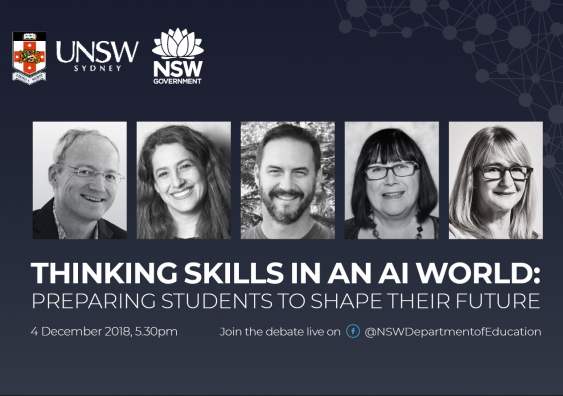Building young people’s interdisciplinary thinking skills will be crucial to ensuring they thrive in an Artificial Intelligence (AI)-future, experts will argue at a joint panel discussion on Tuesday.
The event is hosted by the NSW Department of Education and UNSW Sydney’s Grand Challenges program and will explore the critical questions an AI-world raises for today’s education systems.
Associate Professor Lyria Bennett Moses, director of the Allens Hub for Technology, Law and Innovation at UNSW Law and panellist, said: “Building an interdisciplinary space into the curriculum will provide an opportunity for deep critical thinking about the systems that will, in a large way, govern students’ lives in an automated world. Instead of just learning about Maths, English and Science, they will need to be able to think about how these issues interrelate.”
“For example, when considering issues such as how social media shapes political discourse, there needs to be an understanding of data, computing, history and philosophy.”
Associate Professor Bennett Moses said automation will play an increasingly important role in decision-making among all levels of government and in the corporate world.
“While not everyone will need to be able to do machine-learning for example, there needs to be a level of awareness and critical thinking about how different systems affect us, and this is where the education system can step in.”
The discussion will draw on the expertise of leading UNSW academics and education experts engaged in the Education for a Changing World initiative including Toby Walsh, Scientia Professor of Artificial Intelligence at UNSW, Peter Ellerton, Director of the University of Queensland Critical Thinking Project, Christine Cawsey, Principal of Rooty Hill High School, and Sandy Plunkett, founder of the independent consultancy, Innovation Clearinghouse. .
Walsh, whose paper The AI Revolution includes reflections on how education can be a powerful tool to enable society to adapt to the changes, said: "This (discussion) is one of the most important conversations we should be having as a society. What skills do we all need to acquire to thrive in our AI enabled future?"
The event will be opened by Mark Scott, Secretary of the Department of Education, with closing remarks from Professor Geoff Crisp, Pro Vice-Chancellor (Education) at UNSW.
Mr Scott said today’s education systems need to ensure students have the capacity to critically understand and engage with AI technologies.
“If AI is to be a force for good, our students need to not only be able to use technology but understand how it works and how it impacts them and the world around them,” he said.
“Strong thinking skills are the building blocks that enable students to better know, influence and shape their world.”
The discussion panel will address some of the critical questions AI raises for today’s education systems, such as:
- What types of human intelligence and thinking skills will young people need to leverage the opportunities that advancements in artificial intelligence will bring, as well as to minimise the potential risks?
- How can we ensure that students have the capacity to critically and ethically engage with these new technologies which will increasingly impact on their lives?
- How best do we prepare these future citizens in the face of greater complexity and a more demanding world?
- What might education need to do differently to ensure students are able to positively shape their world?
It will be held on Tuesday 4 December from 5.30pm to 7pm and livestreamed on the NSW Department of Education Facebook page.


